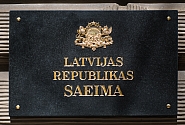
On Thursday, 7 September, the Saeima considered the final report of the Parliamentary Investigative Committee established to assess the effect of the financial sector “overhaul” on the state finance and capital market system.
The Investigative Committee worked for eight months, holding 21 meetings, and one of the conclusions included in the final report is the need for a shared understanding with other countries on money laundering and anti-terrorism policies in Latvia.
The Committee has also concluded that a number of requirements imposed on customers of credit institutions are often excessive and misunderstood, and the final report recognises the need to prevent the continuation of the current situation as regards disproportionate administrative burdens, including costs, as well as the right of legal persons to open a basic business account in Latvia.
Since the formation of the Latvian financial sector in the 1990s, servicing the money of foreign (non-resident) clients has been integral to it, and until 2018, the business model of most credit institutions registered in Latvia was focused on attracting non-resident clients and their funds, forming a bridge between the East and the West, the report explains.
The report highlights many of the reforms implemented since Moneyval's 2018 critical assessment and "red card" to Latvia in the area of financial supervision were necessary, but some of them were rushed and without a comprehensive assessment of their potential benefits or disadvantages to the state. Businesses did not have sufficient time to comply with all the new requirements and rules, which were hastily enacted by the state to avoid potential greylisting by Moneyval.
Only in the last few years has there been a major shift in global attitudes towards the financial sector in the search for solutions to counter the circulation of laundered money, as well as significant changes in the financial sector around the world, such as the banning of anonymous accounts, the requirement for banks to know their customers much better and to cooperate with tax administrations, financial intelligence services, and law enforcement authorities, the final report says.
The report notes that, after 2018, public policy to prevent money laundering and the financing of terrorism and proliferation has focused on significantly increasing control over the activities of credit institutions, which has strengthened control capabilities but has also had consequences for the financial sector and affected the control and punishment of other subjects of the law.
In result of the control and risk assessment of credit institutions' customers by the financial sector supervisor, customers served by Latvian banks—both natural and legal persons—have been moving to neighbouring countries, as the opening of an account is often refused. Account opening is also denied by imposing requirements that are not set by the banking sector supervisor. The final report concludes that lending risks are not managed but simply avoided, and that Latvian banks do not explain the reasons for refusals, which does not give business owners the opportunity to improve their financial situation.
The Committee report also points to the administrative burden for businesses to meet all the requirements for opening accounts, the high monthly cost of maintaining accounts, the need to significantly reduce requirements for low-risk enterprises, and the limited lending opportunities for financing production equipment due to a lack of competition among commercial banks.
The Parliamentary Investigative Committee for strengthening State supervision over the assessment of the negative effect on the state finance and capital market system resulting from the financial sector “overhaul” and for investigating the circumstances of its potential leading to the insolvency of AS PNB Banka and to the forced liquidation of AS ABLV Bank and of the suspension of operations of Baltic International Bank SE was established on 31 January this year upon the initiative of 34 MPs. The Committee was chaired by Vilis Krištopans and included Edmunds Jurēvics, Andris Kulbergs, Ģirts Lapiņš, Viktorija Pleškāne, Harijs Rokpelnis, and Andris Šuvajevs.
Saeima Press Service







